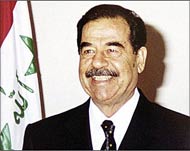US army report on Iraq self-critical
Washington’s reluctance to declare US troops an occupying force stymied efforts to consolidate its hold over Iraq in the immediate aftermath of the invasion.

A post-war self-evaluation by the Third Infantry Division (Mechanised) says the political decision to call the US forces in Baghdad “liberators” instead of “occupying forces” left the division’s officers uncertain about their legal authority.
Under international law, the evaluation says, the troops were indeed an occupation force and had both rights and responsibilities.
“Because of the refusal to acknowledge occupier status, commanders did not initially take measures available to occupying powers, such as imposing curfews, directing civilians to return to work, and controlling the local governments and populace,” the evaluation report says.
Power vacuum
“The failure to act after we displaced the regime created a power vacuum, which others immediately tried to fill,” it said.
The report, marked “For Official Use Only”, was obtained by The Associated Press, the Washington security think-tank Globalsecurity.Org and other outlets.
 |
|
US policy-makers were not ready |
A spokesman for the Third Infantry Division, Major Darryl Wright, characterised it as a candid effort to find ways to improve the division the next time it is called to fight. Its authors are not identified.
In many ways, it mirrors recent criticisms by Jay Garner, the retired US general who briefly headed the first occupation government in Iraq.
Garner said in a BBC interview aired on Wednesday that the military did not act quickly enough to restore law and order and key services in Baghdad, and should have tried harder to win support from the Iraqi people.
Legal matters
In the section regarding legal matters facing the division, the report said unidentified “higher officials” constrained the occupation effort and did not prepare for the fall of Saddam’s government.
|
“They soon saw us as being unable or unwilling to get anything done” US self-evaluation report |
“Despite the virtual certainty that the military would accomplish the regime change, there was no plan for oversight and reconstruction, even after the division arrived in Baghdad,” the report said.
The division confiscated $1 billion from palaces in Baghdad, but was not permitted to use that money to help put the city back on its feet, despite having the legal authority to do so, the report pointed out.
“At first, the people were anxious to get started and looked to the US for assistance. They soon saw us as being unable or unwilling to get anything done,” the report said.
Since the invasion, the US forces in Iraq have come under intense resistance with casualties much higher than during the actual combat. During the invasion, there were 114 US fatalities. Since 1 May when US President George Bush declared major combat operations over, American troops have registered 184 deaths.